Shawn Fain: “Trump Doesn’t Give a Damn About Working-Class People”
An exclusive interview with the UAW president.
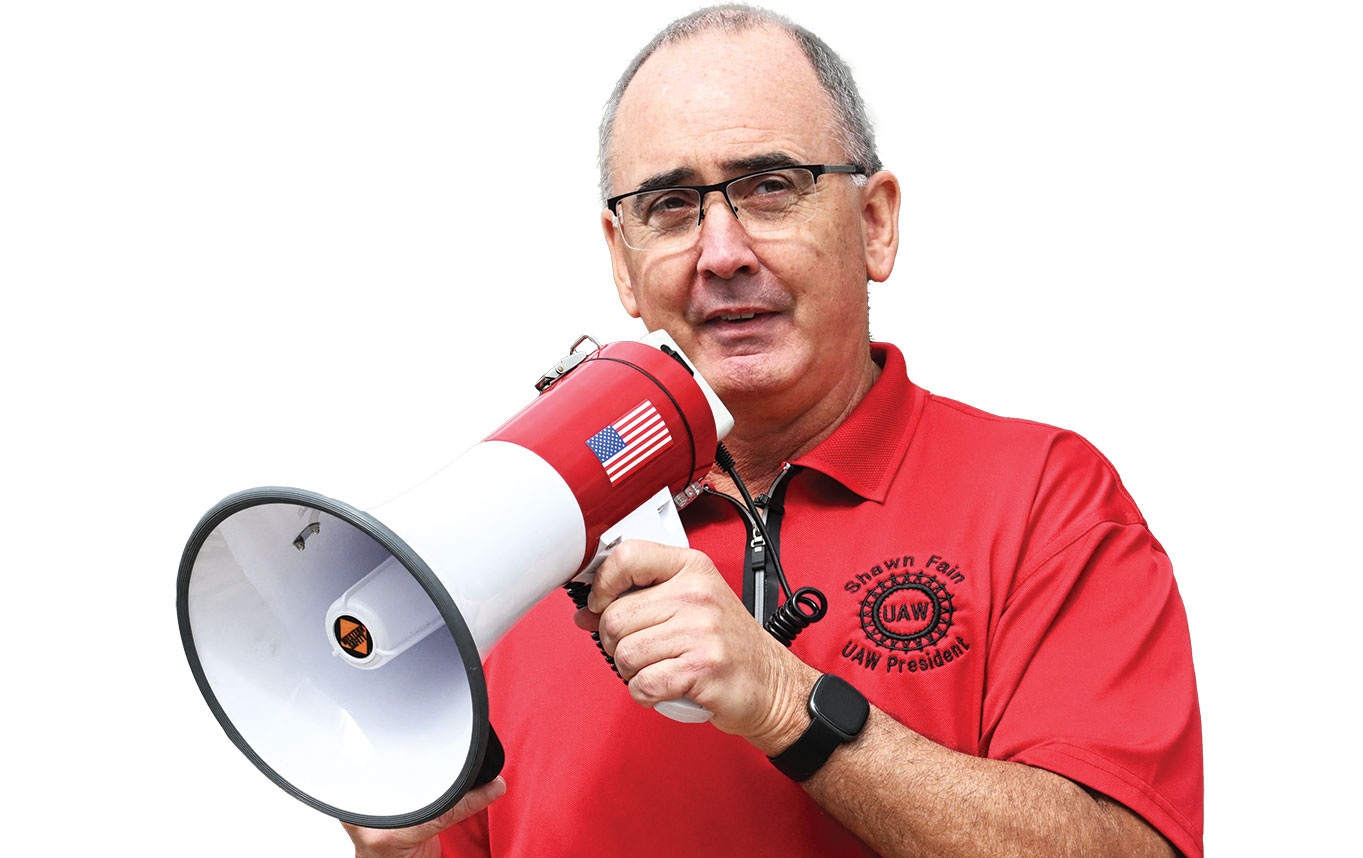
Shawn Fain
(Jim Watson / AFP via Getty Images)Shawn Fain is more than just a labor leader. Since his election a year ago as president of the United Auto Workers, following a rank-and-file revolt against corruption and complacency in one of America’s most storied labor unions, Fain has emerged as the embodiment of working-class anger over income inequality and corporate greed. Last fall, he steered the UAW through a historic strike against the Big Three domestic automakers. The walkout was powered by savvy media strategies and fiery rhetoric that had Fain’s enemies accusing him of inciting a class war. (He cheerfully embraces that image, even appearing once in an “Eat the Rich!” T-shirt.) Since that victory, the UAW has launched a drive to organize foreign-owned auto plants, along with Elon Musk’s Tesla; called for a cease-fire in Gaza; and waded into presidential politics with a fierce assault on Donald Trump’s claim to speak for workers. The Nation met with Fain at the UAW’s Solidarity House in Detroit for this, the first in a series of conversations that we’ll be publishing in the coming weeks with the union leader who says, “Billionaires, in my opinion, don’t have a right to exist.”
—John Nichols
JN: Is it fair to say that the UAW’s strike, along with other union fights last year, got labor off the defensive and remade how Americans think about unions?
SF: Definitely. It was an awakening. I think [frustration has] been brewing for years—and in people like myself, for decades—within our union over leadership that, I felt, was way too close to the companies. But I think the general public as a whole saw it [as a breakthrough moment]. Our strike was kind of a catalyst. And not just ours—the Teamsters didn’t strike [against UPS], but their contract campaign got a lot of interest. It helped our members prepare for a strike. Our members were out there on those practice pickets with the Teamsters and UPS. And the [Writers] Guild and SAG-AFTRA, with their strikes, had an impact. [The sense of a stronger labor movement] is a culmination of all those things.
But I think the Big Three strike just had so much visibility. We started our contract campaign just wanting to get the message to our members and get our members rallied around our issues, and to see how that manifested—and it turned into not just galvanizing our membership but really bringing the public into it. I tell people this all the time, that it was amazing to sit here in this office on the morning of the strike deadline and have [the news] on, and they’ve got a countdown clock for the UAW strike deadline. It’s like New Year’s Eve, and when have you ever seen that for labor?
Seventy-five percent of Americans supporting us in a strike—you’ve never really seen that type of support before. I believe it’s for one core reason: Whether you’re in a union or not, working-class people in this country, in this world globally, are all feeling the same pain. Profits went through the roof for corporations and companies everywhere, and workers have been pushed backwards. The wealth inequality in this world and in this country is so out of control over the last 40 years, to where the few at the top are getting all the profits and everybody else has been left to fend for themselves. When you talk wages, when you talk retirement security, when you talk adequate healthcare and just people having their lives back, their time back—those are issues that matter to not just union people, but to all working-class people. Those are the issues that resonate.
JN: There was a lot of media focus on the economic demands that the union made. But the UAW also proposed a 32-hour workweek, and like many of the European unions, you were saying that there’s got to be some sort of human scale in all this.
SF: That’s the part that always gets left out of everything in this capitalist nation: Humans are a nonfactor in these decisions. Corporations don’t think about humanity. They don’t think about how every decision they make impacts humanity. They think about one thing: the bottom line—shareholder value, dividends, and immediate profit. And that all happens at the expense of human beings. We have to get back to being a human-centered country. We can’t say we’re a nation of the people, by the people, for the people, when corporations and the extremely wealthy have bought our political system through decisions like Citizens United, where [the Supreme Court] called donating money “free speech.” We have to get back to a nation, and a world, that puts humanity first. That’s not going to happen [through] corporations and businesspeople; it’s going to have to happen [through] labor unions. Organized labor, that’s why we’re here—to make life better for people and to have a good standard of living.
When I was a kid, in the early ’70s, a good friend of mine, his dad worked at a grocery store—they had a big family, and a job at a grocery store could sustain a family. When Reagan took over, we saw that start to shift, to where both partners had to get a job. Purchasing power kept shrinking and everything else kept going up. Now we’re at a place where this whole system is upside down—not just in the union, but in this nation, in this world. We need to turn the whole thing [right side up] and get back to [a] reality where it’s people-centered. We’ve let politics hijack everything, and it’s just ridiculous. I am shocked to hear one particular party claim that they are the party of Christianity and everything else. I mean, everything they stand for is completely against humanity and what Scripture would teach us, which is love and loving your fellow human being. Nowhere does it say: “Accumulate all the wealth you can and screw everybody else.”
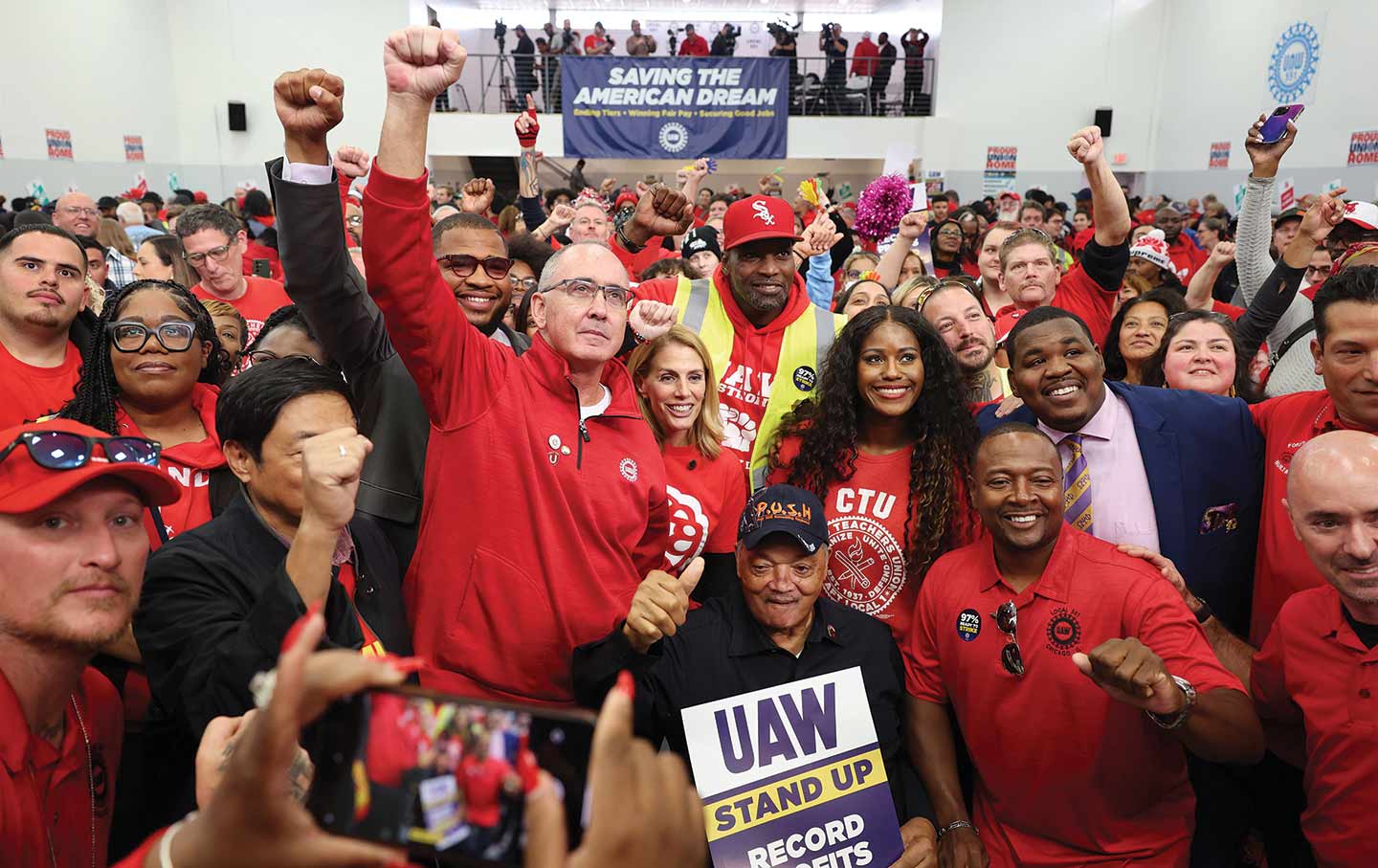
JN: Speaking of politics, it was notable that when President Biden joined the UAW on the picket line last fall, the union had not endorsed him at that point. While some unions had rushed to endorse Biden, the UAW held off. So when Biden showed up for workers, it was important for the union. But it was also important for him.
SF: When I took over as president, I was tired, like a lot of our members, of just watching us give a rubber stamp to candidates in the elections. There was still a lot of work to be done, and so we said our endorsements would be earned…. When we went to the picket line, we gave a call to action, and within, hell, I think it was four or five days, [Biden] was standing on the picket line. First time in our history that a sitting president’s joining a picket line.
JN: Biden joined union members on a picket line, while Trump flew in the same week to appear at a nonunion plant. But it wasn’t just that: Trump came to undermine UAW leadership in the middle of a strike. That’s a very stark juxtaposition. Now that the UAW has endorsed Biden, do you think that can have an impact on swinging working-class voters to Biden?
SF: I believe so. We have to look at facts; not party affiliation, not Shawn Fain’s opinion, facts—the two candidates in their own words, in their own actions. That’s why, when we made the endorsement, I made a PowerPoint and put it on a screen for members to see. When Donald Trump was president, GM was on strike for 40 days. What did Donald Trump have to say? Not a word. What did he do? Not a thing. When [Ohio’s] Lordstown assembly plant was [cutting jobs] when Trump was president, he told workers, “Don’t sell your houses.” What did he say and what did he do after that? Not a thing. What happened? The plant closed. Workers were displaced and moved all over the country. You look at 2015, when Donald Trump was a candidate for president: He came to the central United States and said we need to do a rotation of these good-paying jobs in the Midwest to somewhere where they pay less in this country—meaning the South—and we’ll have these workers begging for their jobs back at any rate. That is not a man who stands with labor. [Contrast that with] Joe Biden: Going back to the recession, he stood with the American worker. While he’s been president, he stood with us on the solid picket line—first time in history a president’s done that. He fought to save a community: [The Biden administration] went into action, they went to work, to help us save a community [Belvidere, Ill., where the UAW has worked to reopen a shuttered Stellantis plant]. They worked with us to bring the battery industry under our standards. There’s a huge contrast between these two candidates. One stands with working-class people, and one represents the billionaire class—and is a member of the billionaire class— and doesn’t give a damn about working-class people.
JN: It sounds like you’re ready to debate Donald Trump.
SF: In a heartbeat.
Disobey authoritarians, support The Nation
Over the past year you’ve read Nation writers like Elie Mystal, Kaveh Akbar, John Nichols, Joan Walsh, Bryce Covert, Dave Zirin, Jeet Heer, Michael T. Klare, Katha Pollitt, Amy Littlefield, Gregg Gonsalves, and Sasha Abramsky take on the Trump family’s corruption, set the record straight about Robert F. Kennedy Jr.’s catastrophic Make America Healthy Again movement, survey the fallout and human cost of the DOGE wrecking ball, anticipate the Supreme Court’s dangerous antidemocratic rulings, and amplify successful tactics of resistance on the streets and in Congress.
We publish these stories because when members of our communities are being abducted, household debt is climbing, and AI data centers are causing water and electricity shortages, we have a duty as journalists to do all we can to inform the public.
In 2026, our aim is to do more than ever before—but we need your support to make that happen.
Through December 31, a generous donor will match all donations up to $75,000. That means that your contribution will be doubled, dollar for dollar. If we hit the full match, we’ll be starting 2026 with $150,000 to invest in the stories that impact real people’s lives—the kinds of stories that billionaire-owned, corporate-backed outlets aren’t covering.
With your support, our team will publish major stories that the president and his allies won’t want you to read. We’ll cover the emerging military-tech industrial complex and matters of war, peace, and surveillance, as well as the affordability crisis, hunger, housing, healthcare, the environment, attacks on reproductive rights, and much more. At the same time, we’ll imagine alternatives to Trumpian rule and uplift efforts to create a better world, here and now.
While your gift has twice the impact, I’m asking you to support The Nation with a donation today. You’ll empower the journalists, editors, and fact-checkers best equipped to hold this authoritarian administration to account.
I hope you won’t miss this moment—donate to The Nation today.
Onward,
Katrina vanden Heuvel
Editor and publisher, The Nation
More from The Nation
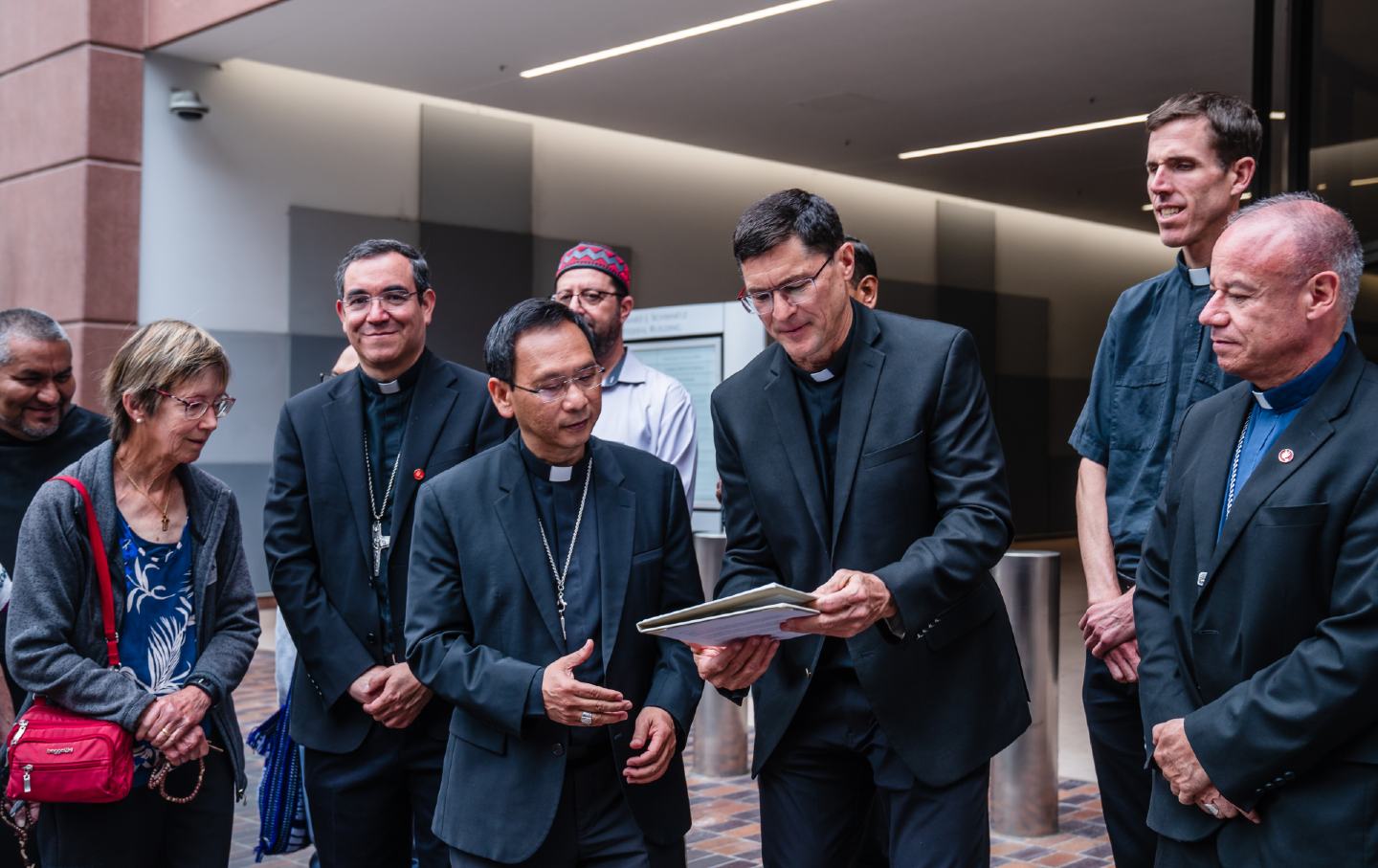
San Diego’s Clergy Offer Solace to Immigrants—and a Shield Against ICE San Diego’s Clergy Offer Solace to Immigrants—and a Shield Against ICE
In no other US city has the faith community mobilized at such a large scale to defend immigrants against the federal government.
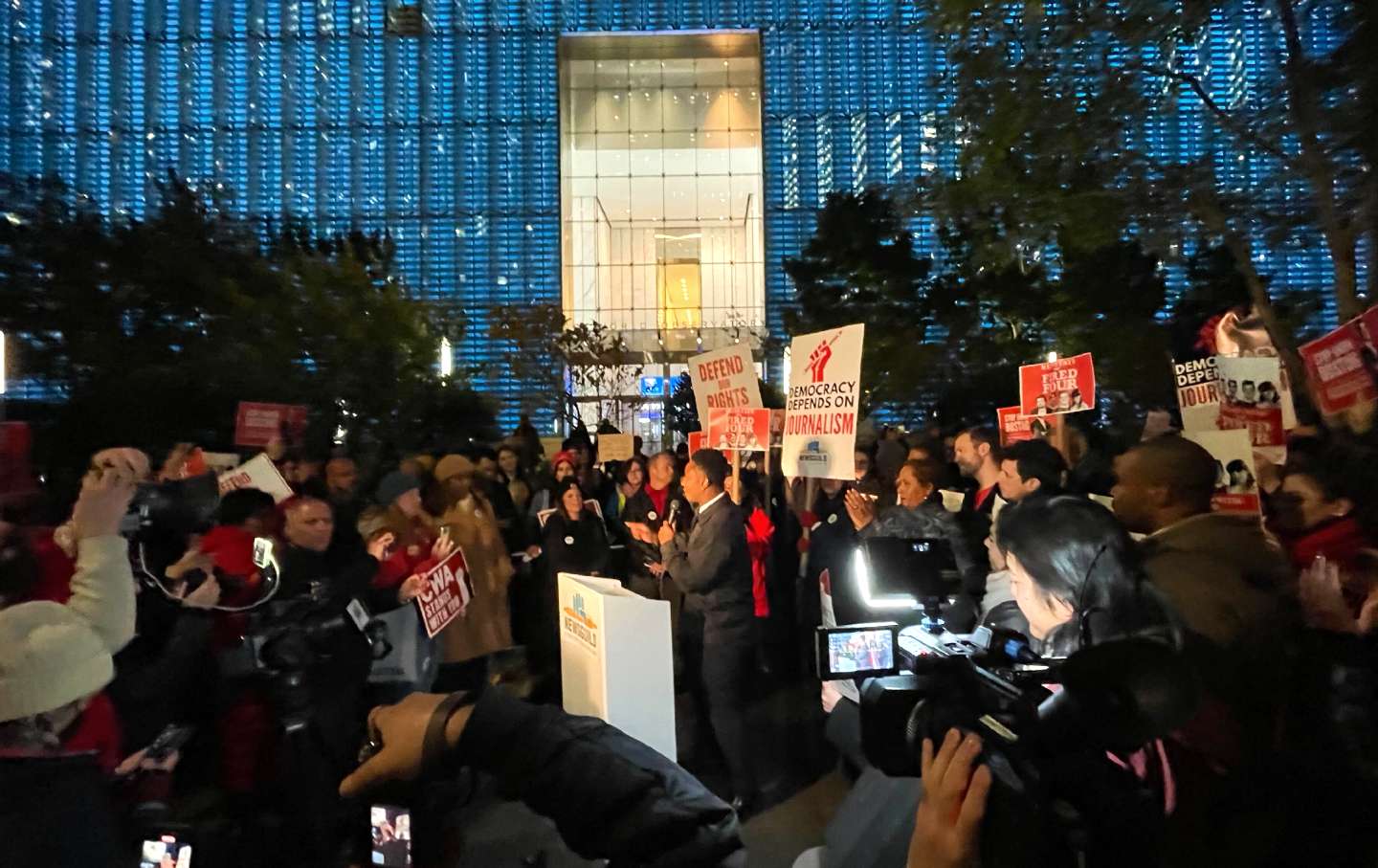
If Condé Nast Can Illegally Fire Me, No Union Worker Is Safe If Condé Nast Can Illegally Fire Me, No Union Worker Is Safe
The Trump administration is making employers think they can ignore their legal obligations and trample on the rights of workers.
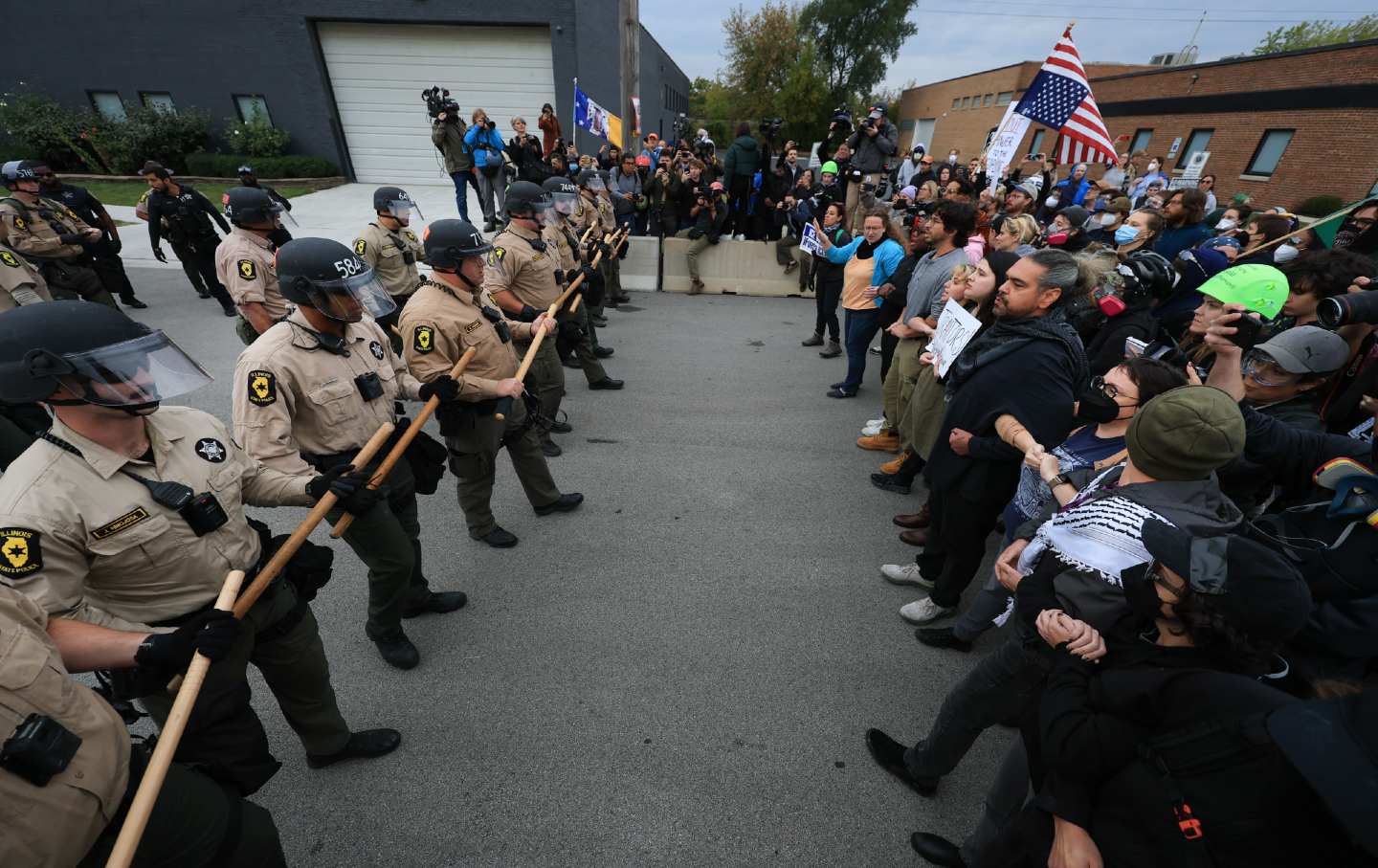
The Counteroffensive Against Operation Midway Blitz The Counteroffensive Against Operation Midway Blitz
How Chicago residents and protesters banded together against the Trump administration's immigration shock troops.
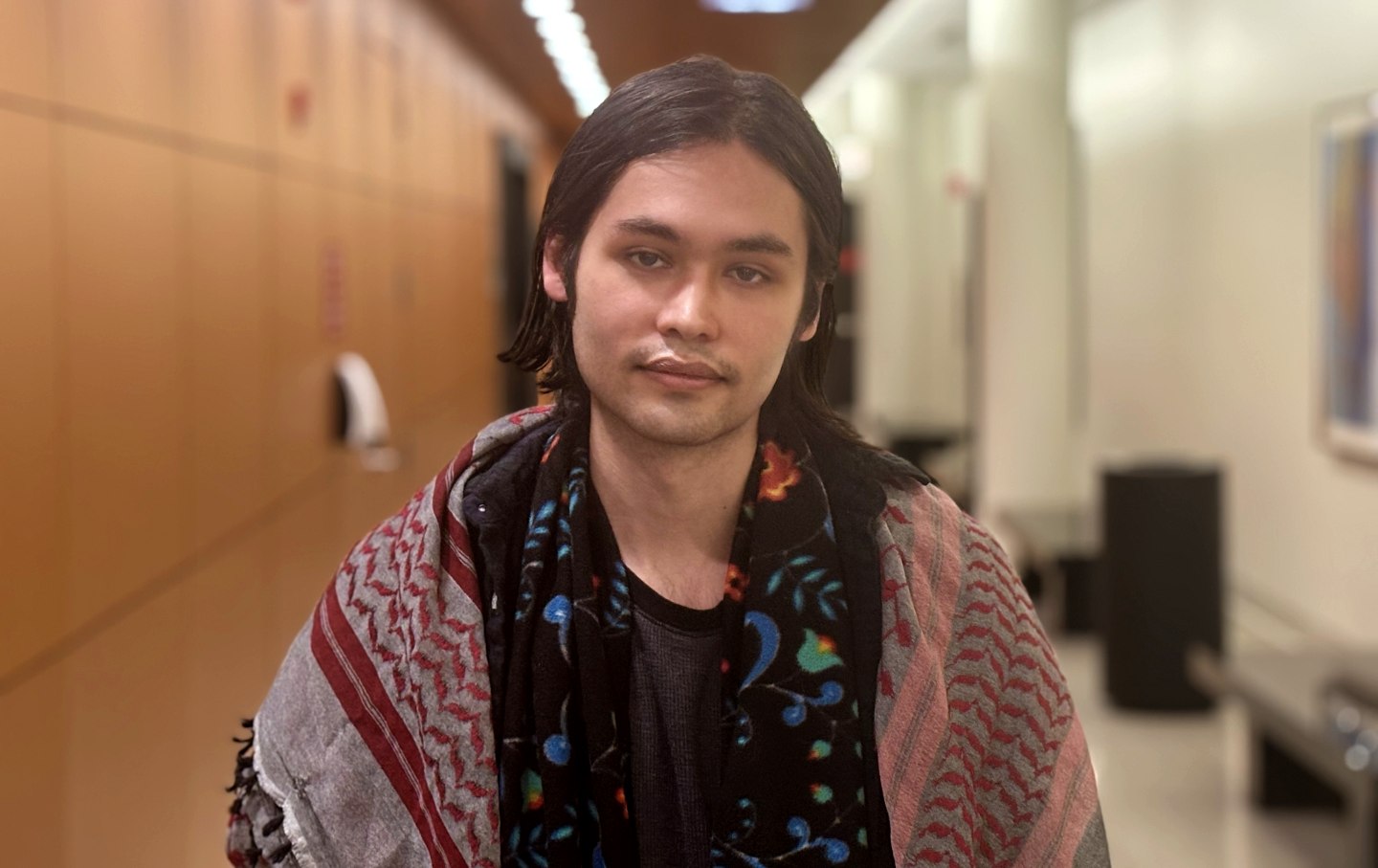
In an Unusual Twist, the Prosecution of a Gaza Protester Puts Israel on Trial In an Unusual Twist, the Prosecution of a Gaza Protester Puts Israel on Trial
An activist argued that genocide in Gaza necessitated disrupting business as usual. The City of Chicago argued in defense of Israel—and against civil disobedience.

The Left Must Build Its Infrastructure The Left Must Build Its Infrastructure
We need to look not at what it will take to win the next election, but what it’ll take to win the next 10 elections.
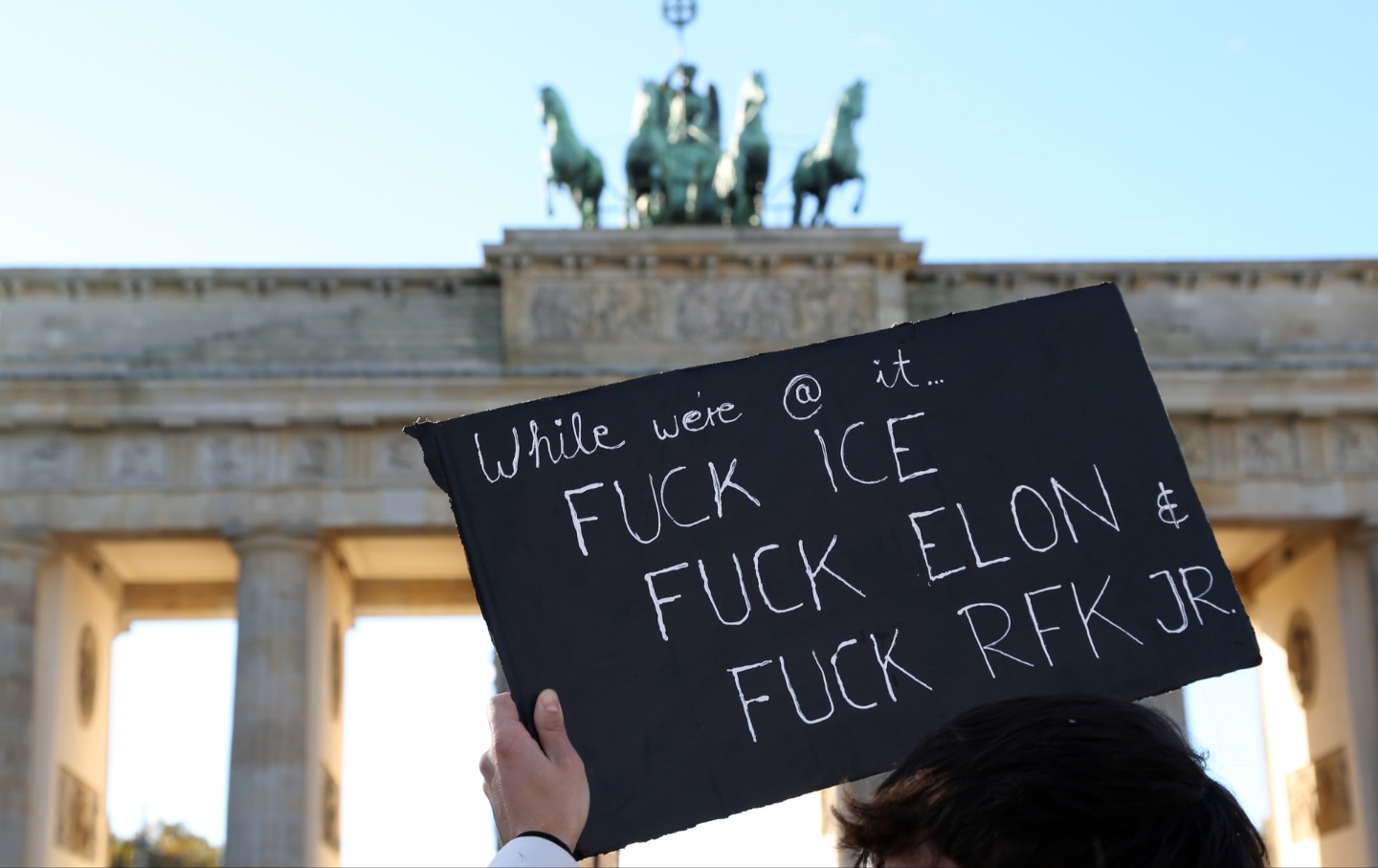
Public Health Was a Place for Warriors Once. It Needs to Be Again. Public Health Was a Place for Warriors Once. It Needs to Be Again.
It's time for us to reconnect with the radical, system-changing spirit that was once at the heart of our field.


